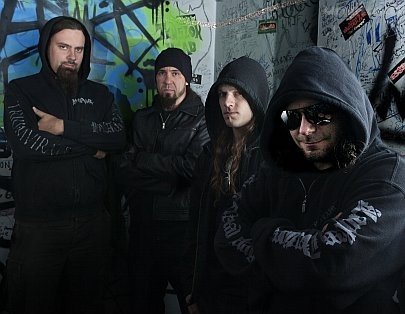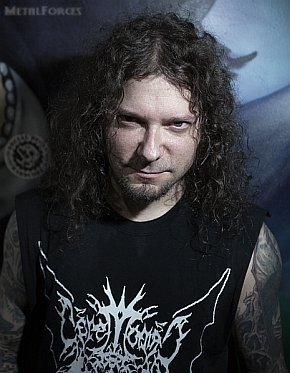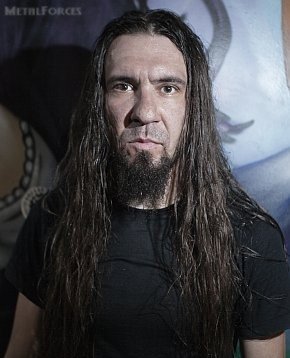
GOATWHORE – Blood For The Masters
Anthony Morgan
February 2012

|
New Orleans, Louisiana-based death metallers Goatwhore were present at local recording studio The Riff Room with Stephen Berrigan on September 5th-6th 2011 to record a cover interpretation of Motörhead’s ‘(Don’t Need) Religion’, the original version of which featured on April 1982 album Iron Fist. Brian Elliott at Mana Recording Studios in St. Petersburg, Florida handled mastering duties, the recording surfacing as a flexi-disc – exclusively available to subscribers – included with the December 2011 issue of Decibel magazine.
“It just kind of fell into place, and it just seemed like the right thing to do because we’re all enormous Motörhead fans and we always have been,” exclaims Sammy Pierre Duet, founder, guitarist and backing vocalist of Goatwhore. “We got offered to do a song, and we were like ‘Well, instead of doing a typical cliché like a Bathory song or a Venom song or a Celtic Frost song why don’t we do a Motörhead song?’ The song just seemed like the right song to do, and it came out really good. We did it in just a day, just recorded it in one afternoon, and it came out awesome. It fits in with what we’re about, and just seemed like the best choice. It was totally left-field, and totally still in the same ballpark.”
Mana Recording Studios in St. Petersburg, Florida has played host to Goatwhore recording sessions on three separate occasions, beginning with September 2006’s A Haunting Curse and continuing with June 2009’s Carving Out The Eyes Of God. Hate Eternal frontman Erik Rutan spearheaded production, handling said duties on fifth studio full-length Blood For The Master as well. “It was really good,” the axeman enthuses. “We’ve worked with Erik Rutan before – this is the third time we’ve worked together – and we know what we’re supposed to do with him when we work. There are certain rules that you have to follow when you work with Mr. Rutan, and basically those rules are don’t fuck around and have your shit together extremely. There are a lot of bands who’ve worked with him in the past who won’t work with him again, because Erik is a very intense person to work with. You can feel that presence, and a lot of bands are intimidated by the way he works. When you work with Erik, you can’t be a sensitive person. You have to be almost ready for anything when you work with him. A lot of bands that have worked with him just can’t take the intensity of working with him, and I guess that’s what weeds out the weak bands from the strong ones. That’s why we’re suited to working with him, because we strive to be strong. He is so stern in what he does; he feels he needs the full performance out of a band and can be a little scary sometimes, but I find that it works with us. We need someone that intense to push us over that edge where the final product comes out absolutely flawless.
“The first time working with him was a trial by fire I guess you could say; we didn’t really know how to prepare ourselves, so we made a lot of mistakes. After that though, when we went into Carving Out The Eyes Of God we knew what to expect working with him. Especially on this new one Blood For The Master we were comfortable and knew what we had to do before we even stepped a foot in the studio with Erik, so it was just a matter of being extremely prepared to deal with any bad situation that might happen.”

|
Sammy hailed Blood For The Master as ‘an experimentation in how much more metal Goatwhore can get.’ “This is just my opinion but as far as just really extreme metal, it’s especially losing its focus in terms of metal attitude,” he clarifies. “The music is becoming more sterile, and becoming more of a fashion statement than an attitude. I feel that we as Goatwhore are trying to bring back that attitude of real, rebellious metal. There are a couple of bands nowadays that – especially a lot of the really popular bands – just don’t embrace that whole attitude of where heavy metal should be. I got into heavy metal a long time ago when I was a kid, and it was very different from how it is nowadays. I guess I’m trying to resurrect that old spirit.
“Metal in general nowadays has become so cross-pollinated which isn’t a bad thing, to take influences from different things and all that. With a lot of bands though it’s lost its extremity I guess you could say, especially some of these newer death metal bands who are black metal bands also. It’s become more of a trend, a fashion statement, where they’re playing music they don’t feel deeply in their hearts. They don’t feel that hate.”
However, that isn’t to say Blood For The Master is an unadulterated death metal album. “I wouldn’t really call it a death metal album,” stresses Goatwhore’s founder. “There’s definitely a death metal influence on there, there’s definitely some black metal influence on there, and there’s definitely some thrash metal influence on there. I would just rather call it an extreme metal album, because I don’t feel that we could be pigeonholed into a certain genre. Some people look at us, listen to us, and call us black metal, and other people say ‘They’re not a black metal band – they’re a death metal band’ and vice versa. I don’t really see us actually being put in a certain genre or category as far as black metal, death metal, or anything goes. I see us as an extreme metal band.”
“I find having genres it makes it easier for people to categorise music, and it’s been there from day one,” he continues. “What is soft rock? What is hard rock? There are always gonna be people who try to categorise to keep things in order I guess, but it doesn’t really piss me off. People who want to say ‘Hey, all I listen to is death metal,’ that’s what pisses me off. There’s good music, and who cares if it’s death metal, thrash metal, black metal, sludge, or doom metal? That’s what really pisses me off, because people try to categorise themselves in their own mind where all they’ll listen to is one form of metal. That to me is just ignorant; it’s eliminating yourself, and makes you look like a moron.”
Sammy feels that Blood For The Master was much more difficult to write. “It’s just that we are very, very particular when we start writing music,” he notes. “If we as a band don’t feel collectively strong about a song or certain parts then we completely dismantle it or destroy it and those parts are scrapped. I guess that was what was so hard about writing the album, because we were so self-conscious about the music. If we don’t feel strongly about it, why would the fans feel strongly about it? That’s what made it so hard when we were writing this album, because we were just really focused on trying to not feel like ‘Well, that part’s okay.’ Instead of settling for okay we settled for amazing, so there was a lot more thinking involved on this new album I found. That’s what made it so hard.”

|
The fear of recycling old material wasn’t a concern, however. “We just go with our feeling, even though there might be some similarities to our past music because that’s what makes you recognisable as a band I think,” the backing vocalist reckons. “You’ll hear it, and you’ll know who Goatwhore are. As far as rehashing old ideas, we never really think like that. We play what we feel, and analyse it later.”
And as well, Sammy estimates that there are elements on album five which Goatwhore ‘wouldn’t normally do.’ “I think there’s actually – on this new one especially – almost more of a doom atmosphere,” he elaborates. “I’m not necessarily saying that there’s some slow stuff; there’s stuff that is slower than what we’re normally used to doing but as far as the style goes, on some of the songs there’s a very doomy kind of atmosphere that we’ve never really tapped into before. I feel that’s coming through our music more now, but like I said, they’re not necessarily sludgy, doomy parts. They just have that doomy atmosphere I think; there’s that hyper-speed and all that stuff that we got recognised for, but now there’s more of an atmosphere.”
Bassist James Harvey (Ritual Killer / Psychon Vex / ex-Rotfest / ex-Aphornon) opens his Goatwhore account courtesy of Blood For The Master. “James fits into the band very, very well,” the guitarist figures. “I was friends with him before he was in the band; I’ve been friends with him for a very long time, and I knew that he would be the right guy for the job. I find that he plays more with the band whereas our past bass players wanted to stand out for themselves, and not really lock in with the music. James locks in more with the music instead of trying to go off on his own, and do something that doesn’t always work. Instead of trying to make things suit his own ends, he’ll try to make the song better. Instead of trying to put a bass solo on top of a guitar riff he plays better with the band, let’s put it that way. He fits the band musically more I find.”
In spite of uncharacteristic elements, Sammy asserts that the record ‘definitely still sounds like Goatwhore.’ This begs the following question; what is the Goatwhore sound? “That’s a good question,” he muses. “I can’t really pinpoint that. It’s just something that I guess you can just hear, and if you’re familiar with our music then you’ll know what it sounds like. The Goatwhore sound is something that is extremely influenced by Celtic Frost, Venom, and Bathory. We’re trying to take that forward while still having that old school vibe. Essentially, that is the Goatwhore sound; it’s a modern, old school sound.”

|
Compared to predecessor Carving Out The Eyes Of God, Blood For The Master treads a more natural path. “With the previous one, we worked really hard on making that album the best album we possibly could musically and lyrically,” the Goatwhore founder recalls. “On this one I felt that we went more with our feeling and more with a vibe, and didn’t say ‘Well, that’s something that we wouldn’t normally do.’ If it sounds good, then why not? That’s as opposed to trying to concentrate on trying to make it sound a certain way. There was a lot of jamming. We let things flow, and it worked.”
The master referred to by the album title Blood For The Master is Satan, one would assume. “If that’s the way you want to look at it, then absolutely,” Sammy replies. “I’m sure that the title means a lot of different things to a lot of different people, but yes, essentially it is referring to Satan. Absolutely. If you’re familiar with Goatwhore, with what we sing about, and what our lyrical content is, I guess it’s very self-explanatory.”
Satan naturally figures in the lyrics sung by vocalist Ben Falgoust, as well as other topics. “As far as the lyrics go, he doesn’t really stray too far off the path that we normally go for,” the axeman confirms. “It’s basically about the destruction of organised Christian religion, Satan, blood, death. All the good things that we always sing about.”
Anti-Christian sentiment runs through the veins of Goatwhore. “I guess it’s because when I was raised as a child I was raised as a Catholic, and we all know that the Catholic religion is probably one of the worst religions in the world,” Sammy presumes. “My parents realised this, so they went into more of a militant Christian religion which was another extreme form of Christian religion. It was just forced down my throat my whole life I guess you could say, and I guess that’s why I detest it. It was something that was bred into me that I didn’t want any part of; I just didn’t feel as strongly about it as my parents did, and it was forced in me my whole life growing up. I guess that’s why I hate it so much, and I have so much adoration for Satan to where it’s the complete opposite of what was forced down my throat my whole life.”
Religion is a prevalent aspect of society within the United States. “Christianity in the United States is a very powerful thing,” the backing vocalist opines. “It’s a sad, sad country that we live in because everyone fears a certain force that they’ve never encountered, the fear of God. I honestly have not met a person who has claimed to have met God or Jesus Christ or whatever, but they follow them so blindedly. It’s such a huge thing in this country, which goes to show you how stupid people are. They want to hear those things, so they believe in that lie and that God. Why is it something that you’re so scared of that you feel you have to dedicate your life to it? Most of these people are complete hypocrites; they go to church on Sunday, but the night before they were out whoremongering, drinking and doing drugs, and basically sinning. Living as a Satanist is almost the same as going to church and saying ‘God, Father, Jesus Christ… Forgive me, I was a bad person last night,’ when in actual fact they were living life for themselves.”

|
Anti-Christian sentiment notwithstanding, that isn’t to say Sammy doesn’t believe in the existence of God. “I believe in God and I believe in Satan equally, but just because I believe in God doesn’t mean that I have to like him very much,” he emphasises. “Satan to me is more a force of nature. This is just what I believe in, but I believe that there’s a little bit of Satan in everyone. I know the difference between right and wrong of course, and I try to be a good being. I’m not gonna go around the street beating the shit out of someone just because I can. I know the difference between right and wrong, but I believe that Satan is a little part of all of us. When you get mad at something and you get totally distraught, or that whole feeling inside of you where you know you’re doing something wrong and you can’t control it, to me that is Satan. It’s a part of all of us, and it’s something that a lot of people try to suppress instead of embrace. I choose to embrace it rather than suppress it.”
Some feel that Heaven and Hell are earthly states one experiences throughout the course of existence, as opposed to their usual biblical depictions. “That’s very hard to answer, because how many people have you talked to who have died and went to Heaven or Hell?,” the guitarist queries. “I honestly haven’t spoken to a human being who has died, come back, and said ‘Hey, it was this beautiful city of white and gold’ or ‘It was on fire, and I was being burnt alive.’ Who knows what will happen after you die? Maybe we are in Heaven and Hell. I guess we’ll all find out after we die what’s real and what’s not.”
Blood For The Master was released in Germany, Austria and Switzerland on February 10th, 2012, in the rest of Europe on the 13th, and subsequently on the 14th in North America, all through Metal Blade Records.
Interview published in February 2012. All photographs by Nathaniel Shannon.
Related Posts via Categories
- SCOTTISH SICKNESS – A Report On The Scottish Death Metal Scene, Featuring BRAINBATH, PUTRID FATE And RANCID CADAVER (October 2022) | Features / Interviews @ Metal Forces
- LARVAE – Join The Hardcore Cult! (June 2022) | Features / Interviews @ Metal Forces Magazine
- TRENCH FOOT – Sacrificing Morals For Gory Obscenities (June 2022) | Features / Interviews @ Metal Forces Magazine
- L.A. GUNS – Trigger Happy (March 2019) | Features / Interviews @ Metal Forces Magazine
- CANCER – Crimes So Evil (November 2018) | Features / Interviews @ Metal Forces Magazine
- U.D.O. – The Tank Drives On (August 2018) | Features / Interviews @ Metal Forces Magazine
- SIEGE OF POWER – Bleeding For The Cause (August 2018) | Features / Interviews @ Metal Forces Magazine
- MOONSPELL – A Taste Of Live Eternity (August 2018) | Features / Interviews @ Metal Forces Magazine
- MONSTROSITY – Dark Matter Invocation (August 2018) | Features / Interviews @ Metal Forces Magazine
- SATAN – Five Magicians (August 2018) | Features / Interviews @ Metal Forces Magazine
|
|





